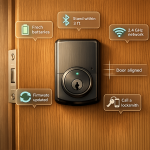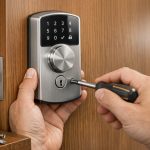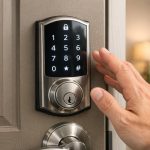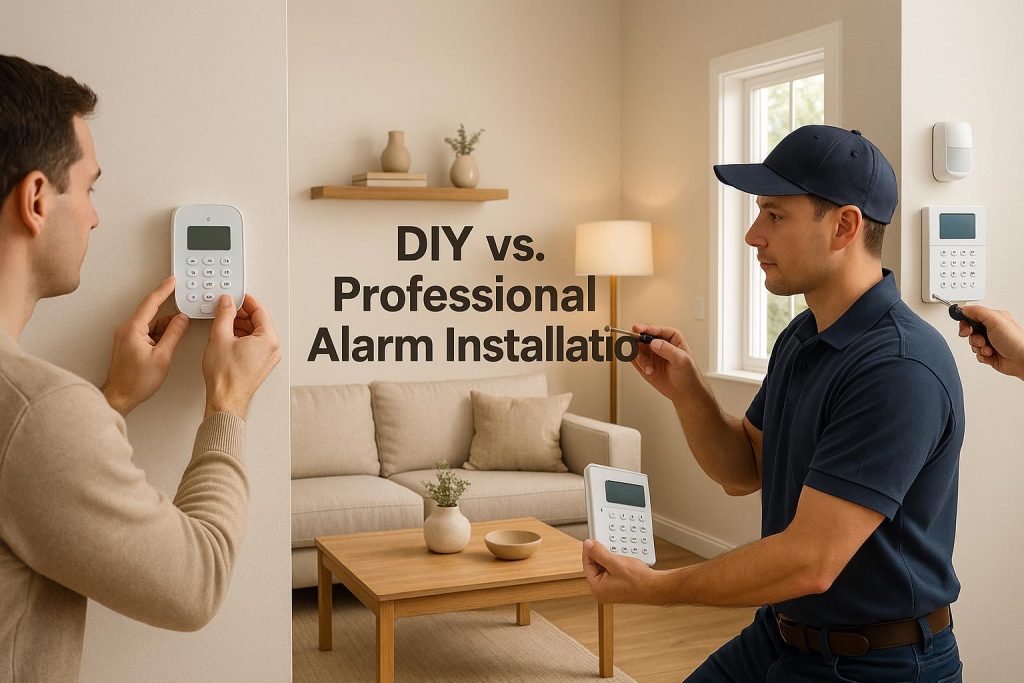When choosing between DIY and professional alarm installation, your decision impacts cost, convenience, and security. Here’s the bottom line:
- DIY Installation: Cheaper upfront ($100–$300), flexible, and ideal for small spaces or renters. However, it relies on your setup skills, which can lead to mistakes and limited support. Best for tech-savvy users with smaller homes.
- Professional Installation: Higher upfront costs ($600–$1,500+) and ongoing fees ($20–$60/month), but offers expert setup, better reliability, and 24/7 monitoring. Perfect for larger homes, businesses, or those seeking peace of mind.
Quick Comparison
| Factor | DIY Installation | Professional Installation |
|---|---|---|
| Cost | $100–$300 (equipment only) | $600–$1,500+ (equipment + labor) |
| Monitoring Fees | Optional ($9–$50/month) | Required ($20–$60/month) |
| Setup Time | 30 min – 3 hours | Handled by experts |
| Best For | Small homes, renters, tech users | Large homes, businesses, high-security needs |
| Support | Limited, self-managed | 24/7 professional assistance |
DIY saves money and gives you control but risks setup errors. Professional installation costs more but ensures a secure, hands-off experience. Think about your home size, budget, and how much help you need before deciding.
DIY Security Systems vs Professional Security Systems
Set Up Your Own Alarm
DIY alarm kits come with all you need: wireless sensors, cameras, and a control panel. They are made for easy use, and you can set them up in as short as 30 minutes or up to 3 hours, with simple steps that an app walks you through. Let’s look at the good and bad sides of doing it yourself.
Why Do It Yourself?
The big pull of DIY alarms is that they cost less. Simple kits can be from $100 to $300, which is cheap next to professional ones that start at $600 plus extra fees from $100 to $500.
They also let you choose more freely. DIY setups don’t tie you to long deals, which is perfect for those who rent or might move. Unlike pro setups that lock you in for 12 to 36 months, DIY can move with you, with no need for service calls or added costs.
In fact, a 2023 survey by Consumer Reports found that 54% of people buying new home security went for DIY. The top reasons? Saving money and the chance to set it up their way.
What Could Go Wrong?
Still, DIY isn’t free from issues. A common mistake is putting sensors in the wrong places. If they’re too high, too low, or just off, they might not spot intruders well.
Another downside is less help for tech troubles. While many kits have basic help for simple problems, sorting out bigger issues can take a lot of time and stress, especially if your system stops working when you need it most.
DIY is also more fit for smaller spaces or flats. Big or spread-out homes could have problems like weak signals or might need more complex sensor setups, which DIY might not cover.
Human errors can mess things up too. If you rush or skip steps, your system might not work as it should.
When DIY Is A Good Idea
DIY fits well in certain cases. It’s best for those who know tech well, have smaller or one-floor homes, or rent. If you want simple security without a big bill at the start, DIY is a good choice. Many also let you watch over things yourself or have low-cost plans from $10 to $30 a month.
It’s also smart for short-term use. If you’re going to move soon or just want to try home security without a full pro setup, DIY lets you start with low risk.
Thinking about these points will help you see if DIY works for you over pro setups, which we’ll look at more later in this text.
Get an Expert to Install Your Alarm
When you choose to have your alarm set up by a pro, you get skilled workers to check your place and make a system just for you. These pros find where your home is weak, craft a fix, and get it all running smooth from the very start.
Why Pick Pro Setup
Pros know where to put sensors so there are no missed spots and fewer false alarms. They think about things like pets moving, air from the AC, and how light falls – stuff that really affects how well sensors work.
Pro systems are tough and have cool extra parts. They come with things like weather sensors and links to smart home tech, plus help and care any time you need it. Unlike ones you set up yourself, these are made to last and have top-notch tools like better entry control.
"When you hire Sherlock’s Locksmith, we ensure that you work with professionals who prioritize quality service and customer satisfaction. We are licensed, insured, and compliant to industry standards, so you have peace of mind knowing the job will be done reliably and to a high standard."
One big plus is how well your alarm system can work with other smart home tech if set up by a pro. Pros take care of all the hard wiring and making sure everything talks to each other right – a tough thing to get with DIY.
Problems with Pro Setups
Even though pro setups have lots of good points, they come with downsides too. The biggest problem is how much they cost. Setting up can run you from $500 to $1,500 or even more, based on how big your place is and how tricky your system is. This cost is way more than DIY systems, which usually stay under $500.
Pro systems also have ongoing costs, usually $30 to $60 every month. Over time, these fees keep adding up, and might end up costing more than what you’d save by not picking a pro setup in the first place.
Another issue is less freedom to tweak things. If you need fixes or changes, you often have to wait for a tech to come by. This can be a hassle if you like to do things yourself. Having to set times for them to come can be less handy than DIY approaches, which let you work on things right when you want to.
Long-term deals are another thing to think about. Pro setups often make you agree to stay for 12 to 36 months, which can make it pricey to switch or stop. Changes need a tech too, which may delay tweaks and add to costs.
Best Times for Pro Install
For places that need tight security, having pros do it is often the smart move. Big houses with lots of doors, tricky layouts, or lots of floors get safer when experts run the show. They make sure every part is protected.
Business sites, in a special way, need the care and sureness that pro systems offer. Things like entry control, worker cards, and insurance rules make pro installs a must.
"Lock and security issues in a commercial setting can significantly impact operations and productivity." – Sherlock’s Locksmith
Things like finger scan locks, gate setups, and system checks need someone good to put them in. They are very specific and must be set just right to work well.
Getting a pro to set it up is also best for places with costly stuff or high security needs. The top-notch checks and steady watch by these systems give better safe-keeping for valuable things or stuff you own.
Also, if you’re short on time or not sure how to handle the tech part, getting a pro is an easy fix. They do it all, from looking into it to setting it up and keeping it going, making sure it runs smooth from the get-go. For many, the ease and no-worries feel are worth paying more.
Comparing the Cost and How Well It Works
Let’s look at the facts and figures to get a clear idea of how DIY and pro alarm setups do in terms of cost and how well they work. Knowing the differences can help you pick what works best for you.
Breaking Down the Cost
When figuring out the cost of an alarm, think about the gear, the set up, and keeping an eye on things. DIY setups might look cheaper at first, but pro setups, even though they cost more, often give you more for your money over time.
- DIY setups generally cost about $100 to $300 for simple ones. More high-tech kits can go from $300 to $600. You put it together yourself, so you don’t pay for labor. But, if you choose to, professional watching can add a monthly fee of about $9 to $50.
- Pro setups have higher costs at the start. Gear prices can be from $300 to $1,500, and to have someone set them up adds $100 to $500 or more. To have someone watch over the system usually costs $20 to $60 each month and you often sign a deal for 12 to 36 months.
Here is a cost check side-by-side over three years:
| Part of Cost | Self-Made System (3 Years) | Pro System (3 Years) |
|---|---|---|
| Gear | $200 | $600 |
| Set Up | $0 | $300 |
| Watch (36 months) | $0–$360 | $720–$2,160 |
| Full Cost | $200–$560 | $1,620–$3,060 |
Over three years, having a system set up by pros can cost up to five times more than setting it up yourself. Yet, the price is just one side of the story – now, let’s think about how well it works.
How Well They Work
Saving money is good, but the real worth of a safety set-up is in how well it works. DIY sets, while low in price, often have a higher chance of set-up mistakes. Owners may put parts in the wrong spots or miss weak spots, leaving parts of their home open. When things go south, help is often just online or basic help from a service team, which may not be enough when it’s most needed.
But, pros do the job right because they know just where to put parts for the best safety. They make sure it works with less false alarms and better threat notice. Also, pro sets have a team ready to help, which is key when you need to fix problems.
How Safe You’ll Be Later
Picking between DIY and pro doesn’t just hit your pocket – it affects how safe you feel later on. Pro setups are made to work well right away, keeping you safe all the time with non-stop help. This matters a lot for shops, where even one slip in safety can stop work or cause big losses.
DIY can still be good if you put it in just right. But, small slip-ups in how it’s set up could leave your space open as time goes on. For big homes or tricky spaces, the first money put into a pro system often pays off with better safekeeping and less hassle later.
sbb-itb-643e28e
Home Security Choices
Home security is key, and the choices of features and how you watch over your home really shape how safe and easy it feels. Choosing between setting it up yourself or getting pros to do it changes what tech, help, and freedom you get with your system. Each has its own plus points that may change how safe and easy your place is to look after.
Comparing System Features
DIY alarm setups are made simple. They usually have sensors for doors and windows, motion sensors, a main hub, and phone control for easy watching. Most kits also have basic cameras and simple smart home tools, like using one app to control lights or locks.
Pro systems, though, are made tough and high-end. They usually have clear video cameras, sensors for smoke, carbon monoxide, and leaks, as well as smart locks and better smart home ties. Some even add extras like locks that read your print, water shut-off tools for leaks, and setups where lights and alarms sync perfectly.
Pro systems also have hard-to-break parts and backup power, making them trusty during power cuts or if someone tries to mess with them. On the other hand, DIY setups use parts that vary in quality and may set off more false alarms.
| Feature Type | DIY Systems | Professional Systems |
|---|---|---|
| Basic Security | Door and window sensors, motion tags | Better sensors placed just right |
| Cameras | Simple cams with few extras | Top quality cams set up by pros |
| Smart Linking | Works with some systems | Links with all smart home tools |
| Safety Tools | Simple smoke finders | Finders for smoke, bad air, leaks, and heat |
| Key Means | Locks run by app | Locks you open with your body, and all link together |
| Tool Grade | Users set these up | Tough tools made for shops |
Watching Choices
Watching is one part where DIY and pro ways are very unlike. With DIY, you often check on things yourself. Warnings go to your phone, and it’s up to you to call for help, look at your cameras, or ignore what might be a wrong alarm.
Pro setups, though, always include 24/7 pro watching. This means trained staff are ready to act on warnings, call for help, and deal with issues even if you’re out cold, away, or your phone has died. This help often costs $30 to $60 each month and usually needs you to agree to a 12 to 36 months deal.
The trust in pro watching is made strong by things like extra power and more ways to communicate, along with the know-how of staff trained to tackle urgent needs. These upsides give peace of mind that self-watching can’t equal.
System Adding and Mixing
DIY setups do well with change. Most are easy to add onto, letting you put in more sensors, cameras, or other units as your needs shift. They work on wireless tech, which is best for those who rent or move a lot. But, they might have trouble mixing third-party smart home units or setting up tricky automatic rules.
Pro setups, on the other hand, are made for smooth mixing and steady growth. Skilled workers can build custom fixes that fit your safety needs well and change as your needs do. Places like Sherlock’s Locksmith show this path, giving expert set-up, mixing, and help all along. Their workers make sure your setup runs well with other tech and can boost or change it as needed.
Sherlock’s Locksmith: Your Top Safe Helper in Pittsburgh, PA
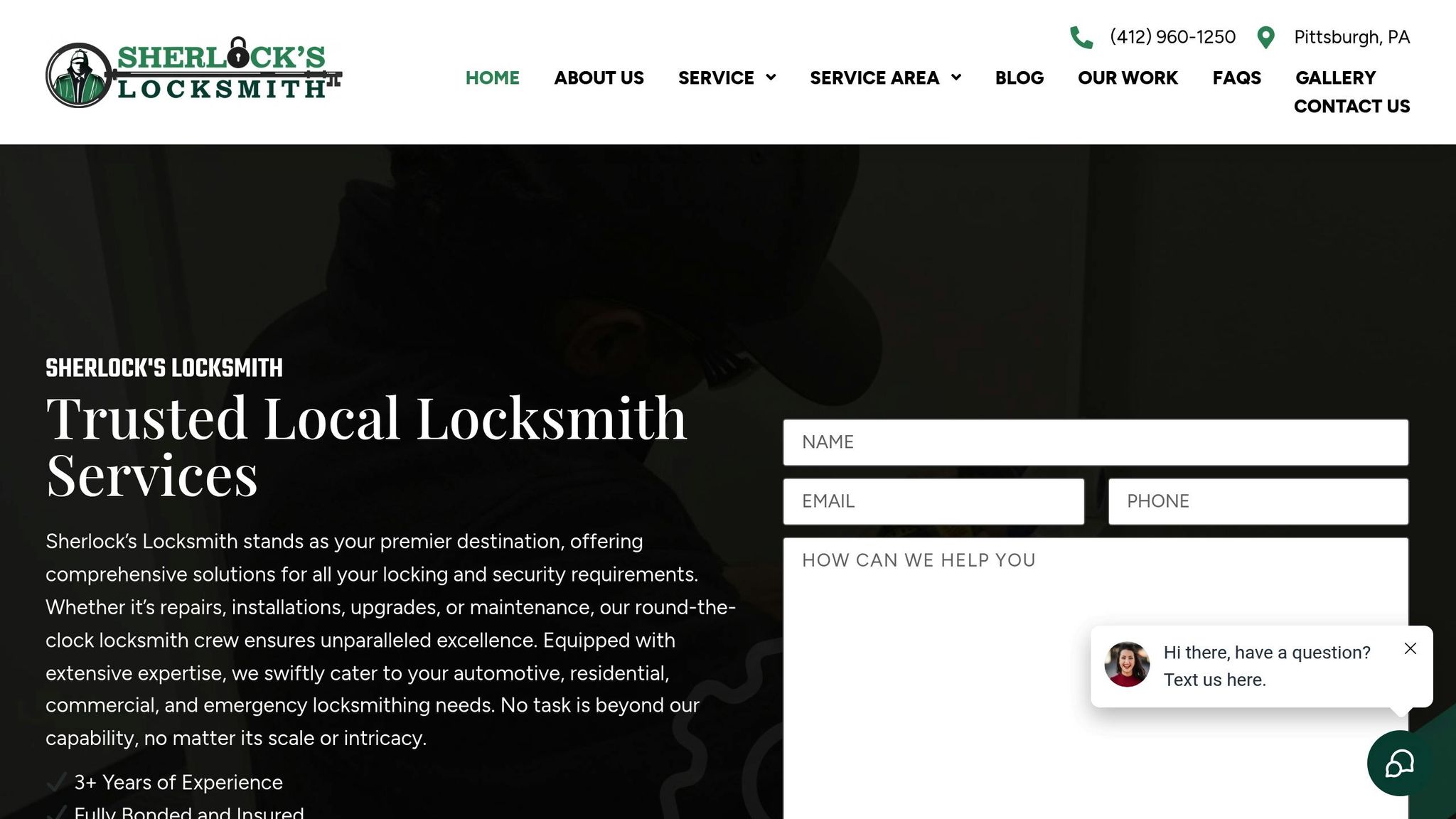
Sherlock’s Locksmith is a key name in Pittsburgh when you need to keep your most prized things safe. They are known for top-notch alarm system setups and have a high 4.9/5 rate from 122 Google reviews. This local shop wins trust by giving strong safety ways that do more than what you can do by yourself. They are real pros when keeping your place safe for a long time. Let’s look at how their sure installs, wide help, and 24/7 care give real peace of mind.
Sure Pro Install Services
Sherlock’s Locksmith cuts the guesswork out of setting up alarm systems by using sure pros with lots of special training. These pros check your place well to find each unique safety need, from doors to weak spots. By picking the best spots for sensors and cameras, they cover a lot, with few unseen areas – a tough job with DIY kits.
What sets their work apart is how they shape each system for each place, be it a small house or a big work area. They focus on details so that every setup works its best.
Full Safety Ways
Sherlock’s Locksmith does more than just alarms. They also offer full works like lock putting in, fixing, changing keys, making new keys, and taking safety higher. They mix alarm systems with smart locks, cameras, and other checks for an all-in-one safety feel that DIY kits can’t match.
For work spots and big homes needing more safety, they have strong options like top-level tools and ways to know who comes in by body traits. These ways give safety that’s way above normal, making clients feel sure about their safety setups.
Help All Day and Night
With their all-around help, they add a lot to what they give. Not like DIY setups, which often leave users with no fast help, Sherlock’s Locksmith makes sure that pro help is just a call away – day or night.
"At Sherlock’s Locksmith, our commitment remains steadfast as we provide mobile locksmith solutions across Pittsburgh, PA. Our seasoned locksmiths come prepared with cutting-edge tools and technology, enabling locksmith to rekey house, craft duplicate keys, and promptly address any emergency lockout situation." – Sherlock’s Locksmith
Their trucks come with cool tools and spare parts, letting folks fix systems, set up new stuff, or make fast security fixes right there. They are quick to show up, which is key when you have break-ins or systems go down. People often cheer their speedy help and skilled way of dealing with urgent issues, showing the firm’s strong aim to sort out security problems well.
For folks and shops in Pittsburgh thinking about professional setup against doing it themselves, Sherlock’s Locksmith has the skills, trust, and help you need to make a simple alarm into a top security system that fits what you need.
Ending: Picking How to Put in Your Alarm
DIY vs Paid Help Summary
DIY setup is great for small homes, tight money, and those good with tech. It saves money as you don’t pay to set it up, and you can have it ready from half an hour to three hours, based on how complex it is. Still, it comes with risks – if you mess up or need help later, it’s all on you.
Paid setup, though it costs more (starts at $99), means you get an expert’s help and help after it’s in. These pros can spot problems you might miss and ensure everything meets the right rules. This way is often best for big homes, complex security needs, or if you like knowing someone is watching out all day, all night.
| Factor | DIY Installation | Professional Installation |
|---|---|---|
| Good For | Small homes, renters, tech lovers | Big homes, needing sure safety |
| First Cost | Less (no fee to put in) | More (fee to put in) |
| Time to Install | 30 min – 3 hours (at own pace) | Set time, done by pros |
| Can Trust? | May make mistakes | High, as pros set it up |
| Help Given | Little, fix it yourself | Always there, expert help |
This breakdown shows that choosing between saving money now and making sure of lasting dependability is a tough call.
Last Points on Safety
This look at the facts shows that costs and surety are the big things to think about when picking either DIY or pro setup. If your place is small, like an apartment, and you only need simple safety, DIY might save you money and work just fine.
For bigger or more detailed houses, paying more at first for a pro to do the job might be best. It makes sure your system is set up right, with stuff put right where it needs to be and help from experts.
When you need to choose, think on these points: how big your place is, if you are okay with tech, your money limits for both start-up and keeping it going, and how much help you want. Pro setup tends to be more sure and has fewer mistakes, while DIY lets you change things as you need and take charge.
If you really care about things working well, think about using a service like Sherlock’s Locksmith. They have pros who can mix alarm systems with smart locks and cameras, making a full safety fix. They also have help ready all the time, so you’re not alone in emergency – a big plus for keeping your house safe.
FAQs
What are the risks of installing an alarm system yourself instead of hiring a professional?
Setting up an alarm system on your own might seem like a budget-friendly option, but it comes with its share of challenges. Incorrect installation can lead to performance issues, potentially leaving your home or business exposed to threats. Plus, DIY systems often lack advanced features or the ability to seamlessly integrate with other security devices, mainly due to limited technical know-how.
On the other hand, opting for professional installation ensures the system is not only installed correctly but also customized to fit your property’s unique requirements. Trained technicians bring the right tools and expertise to maximize the system’s performance and reliability, helping you avoid costly errors or security gaps. While the initial expense may be higher, the added confidence and dependable protection make it a worthwhile investment.
What are the long-term cost differences between DIY and professional alarm system installations, including monitoring and maintenance?
When comparing the long-term costs of DIY alarm systems and professionally installed systems, several factors come into play – like equipment quality, monitoring fees, and maintenance expenses.
DIY systems are appealing for their lower upfront costs since you handle the installation yourself. However, they often come with ongoing subscription fees for monitoring services, which can accumulate over time. Plus, if something goes wrong, you might have to cover the costs of repairs or upgrades out of pocket.
On the flip side, professionally installed systems usually come with higher initial costs because of installation fees. That said, they often include warranties and dependable customer support. These systems also tend to offer more comprehensive monitoring services, which can provide added peace of mind and a stronger sense of security.
When deciding between the two, think about your budget, how comfortable you are with handling technical tasks, and the level of security you want for your home or business.
When should you choose professional alarm installation instead of a DIY setup?
When it comes to setting up a security system, opting for professional alarm installation can often be the smarter choice. With seasoned experts handling the process, you can trust that the system will be installed correctly, reducing the risk of technical hiccups and ensuring your property stays protected.
This option is particularly useful for larger homes, businesses, or setups involving advanced features like smart home integration. Professionals take care of the tricky parts, such as managing complex wiring, placing sensors for optimal coverage, and thoroughly testing everything to ensure it works as intended. While DIY installation might seem like a cost-effective option upfront, professional installation provides lasting dependability and ongoing support – making it a solid investment for many scenarios.



